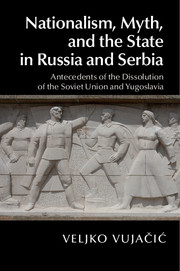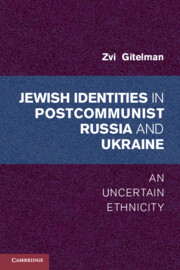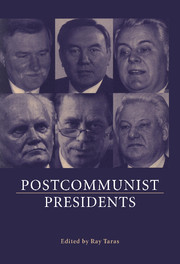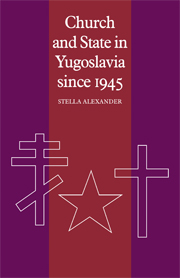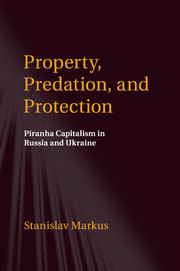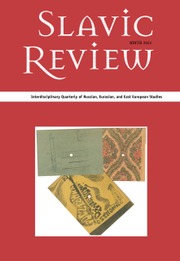Nationalism, Myth, and the State in Russia and Serbia
Antecedents of the Dissolution of the Soviet Union and Yugoslavia
$120.00 (C)
- Author: Veljko Vujačić, Oberlin College, Ohio
- Date Published: March 2015
- availability: Available
- format: Hardback
- isbn: 9781107074088
$
120.00
(C)
Hardback
Other available formats:
Paperback, eBook
Looking for an examination copy?
If you are interested in the title for your course we can consider offering an examination copy. To register your interest please contact [email protected] providing details of the course you are teaching.
-
This book examines the role of Russian and Serbian nationalism in different modes of dissolution of the Soviet Union and Yugoslavia in 1991. Why did Russia's elites agree to the dissolution of the Soviet Union along the borders of Soviet republics, leaving twenty-five million Russians outside of Russia? Conversely, why did Serbia's elite succeed in mobilizing Serbs in Croatia and Bosnia for the nationalist cause? Combining a Weberian emphasis on interpretive understanding and counterfactual analysis with theories of nationalism, Veljko Vujačić highlights the role of historical legacies, national myths, collective memories, and literary narratives in shaping diametrically opposed attitudes toward the state in Russia and Serbia. The emphasis on the unintended consequences of communist nationality policy highlights how these attitudes interacted with institutional factors, favoring different outcomes in 1991. The book's postscript examines how this explanation holds up in the light of Russia's annexation of Crimea.
Read more- Utilizes an interdisciplinary approach that traverses the boundaries among sociology, history, political science, and Slavic studies
- Provides a theoretical and methodological approach offering a model combination of historical interpretation and causal explanation, and illustrating the fruitfulness of a Weberian approach in a small-n study
- Connects to contemporary issues with a postscript on Crimea that makes clear how the book's argument fits into the most recent developments in Russia and the Ukraine
Reviews & endorsements
"In this much-needed study, Veljko Vujačić takes the reader on a fascinating journey through the comparative history of Serbia and Russia for the purpose of understanding the violent collapse of Yugoslavia in the early 1990s as counterposed to the relatively peaceful dissolution of the Soviet Union. Along the way, he explores the theoretical contributions of Max Weber and other historical sociologists to understanding nationalism and its reliance on mythopoetic historical memory. An intriguing postscript about the Russian annexation of Crimea concludes this altogether highly illuminating and carefully argued book."
Norman Naimark, Stanford UniversitySee more reviews"Veljko Vujačić’s deeply learned and lucidly argued study of the long-term legacies of nation- and state-formation in Russia and Serbia is a model of Weberian comparative historical sociology."
Rogers Brubaker, University of California, Los Angeles"Totally contrary to the leader-focused explanation common in the early 1990s of why the Soviet Union disintegrated peacefully and Yugoslavia did not - Yeltsin versus Milosevic - this fascinating, richly documented, and utterly creative use of this paradox insists instead on the role of collective historical memory. It is a must-read for any student of nationalism, of the politics of state disintegration, and of secessionist movements anywhere, including those interested in the continuing conflicts with Kosovo and Ukraine."
Susan L. Woodward, Graduate Center, City University of New York'This is a complex volume that will engage the reader on multiple levels: from controversial theoretical and methodological frameworks, to historical interpretations and assessments, to evaluations of literary works. … One thing is certain, this volume will leave no one indifferent.' Gordanza Uzelac, Slavic Review
Customer reviews
Not yet reviewed
Be the first to review
Review was not posted due to profanity
×Product details
- Date Published: March 2015
- format: Hardback
- isbn: 9781107074088
- length: 336 pages
- dimensions: 234 x 157 x 26 mm
- weight: 0.66kg
- contains: 3 tables
- availability: Available
Table of Contents
Introduction
1. Russians and Serbs in the dissolution of the Soviet Union and Yugoslavia: grounds for comparison and alternative explanations
2. States, nations, and nationalism: a Weberian view
3. Empire, state, and nation in Russia and Serbia
4. Communism and nationalism: Russians and Serbs in the Soviet Union and Yugoslavia
5. The nation as a community of shared memories and common political destiny: Russians and Serbs in literary narratives
Conclusion
Postscript.
Sorry, this resource is locked
Please register or sign in to request access. If you are having problems accessing these resources please email [email protected]
Register Sign in» Proceed
You are now leaving the Cambridge University Press website. Your eBook purchase and download will be completed by our partner www.ebooks.com. Please see the permission section of the www.ebooks.com catalogue page for details of the print & copy limits on our eBooks.
Continue ×Are you sure you want to delete your account?
This cannot be undone.
Thank you for your feedback which will help us improve our service.
If you requested a response, we will make sure to get back to you shortly.
×
